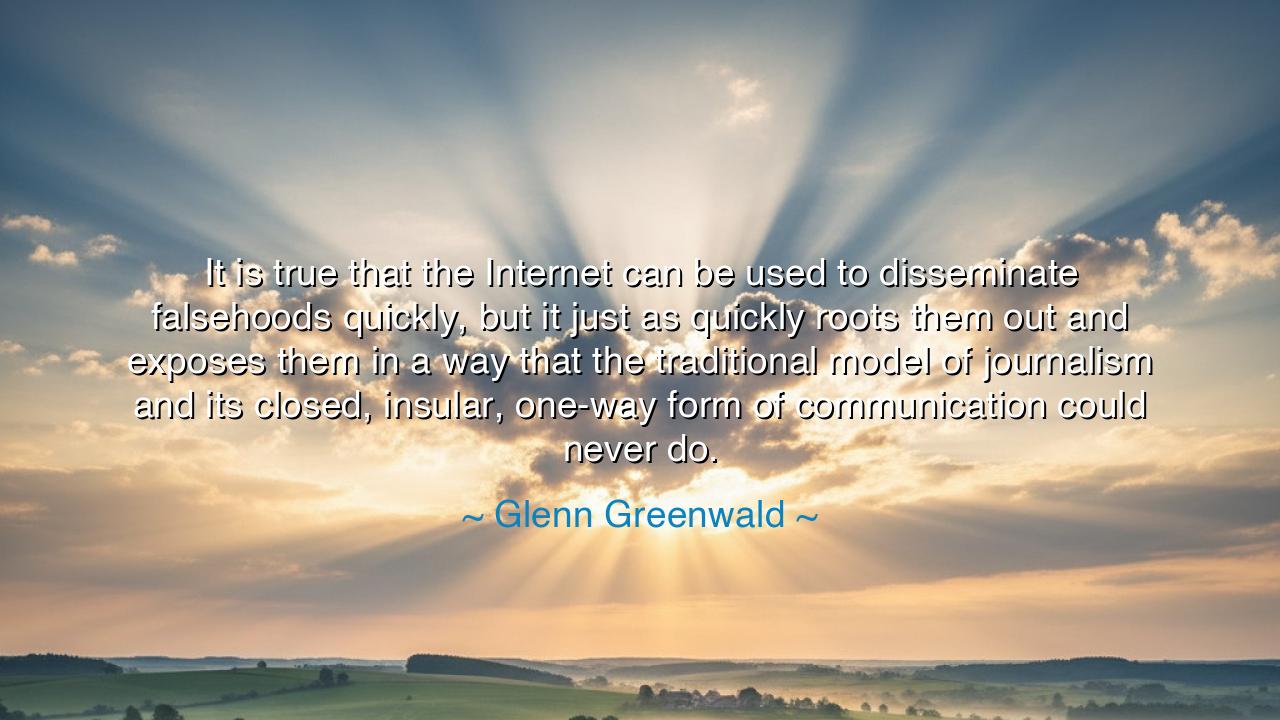
It is true that the Internet can be used to disseminate
It is true that the Internet can be used to disseminate falsehoods quickly, but it just as quickly roots them out and exposes them in a way that the traditional model of journalism and its closed, insular, one-way form of communication could never do.






Host: The room feels calm, with the soft glow of the lamp casting a warm, inviting light across the space. Outside, the world has quieted down, and the peaceful atmosphere seems like the perfect setting for a conversation about media, truth, and the role of the internet in shaping our understanding of the world. Jeeny sits on the couch, her legs tucked beneath her, a cup of tea resting in her hands. Jack, standing near the window, gazes out at the darkened world outside, clearly lost in thought.
Jeeny: “Jack, I came across a quote from Glenn Greenwald today that really made me think about how the internet has changed the landscape of journalism and truth,” she says softly. “He said, ‘It is true that the Internet can be used to disseminate falsehoods quickly, but it just as quickly roots them out and exposes them in a way that the traditional model of journalism and its closed, insular, one-way form of communication could never do.’ What do you think about that?”
Jack: He turns slowly, a thoughtful expression crossing his face. “That’s an interesting perspective. It’s true that the internet has allowed for the rapid spread of information, both true and false. But Greenwald seems to be highlighting the power of the internet not just in spreading information, but in exposing falsehoods. The same speed that allows misinformation to spread also enables fact-checking, crowdsourced truth, and the unmasking of deceptive narratives in real time. It’s a dynamic that traditional journalism — which has its own checks and balances — couldn’t achieve to the same extent.”
Jeeny: “Exactly. In the past, news would come through established channels, controlled by a few gatekeepers. The public had limited access to alternative perspectives, and the information flow was one-way. But with the internet, that has completely changed. Now, anyone can contribute, fact-check, and challenge what’s being reported. It’s much harder for falsehoods to remain unchecked because the internet creates a platform for rapid responses and open dialogue.”
Host: The light in the room seems to soften as the conversation deepens. Jeeny speaks with an understanding that the internet’s democratization of information has both advantages and challenges. Jack stands still, reflecting on the way technology has changed how we access and verify information.
Jack: “I think Greenwald’s point is powerful because it recognizes both the potential for misinformation and the ability of the internet to expose it. There’s this push-and-pull dynamic. The internet allows falsehoods to spread quickly, yes, but it also allows counter-narratives to emerge just as quickly. The speed of information means that nothing can stay hidden for long — whether it’s a corrupt politician, a corporate scandal, or a misleading story. In that sense, the internet might actually be more effective at holding people accountable.”
Jeeny: “Yes! It’s like the internet is a double-edged sword. On one hand, it can be used to manipulate and deceive, but on the other, it allows people to share knowledge and correct the record in ways that were never possible before. People have access to platforms that can challenge the mainstream narrative, fact-check in real time, and expose wrongdoing in ways that were previously unimaginable. The internet forces transparency.”
Host: The conversation grows richer now, as they reflect on the complex and evolving role the internet plays in shaping public discourse. Jeeny and Jack both agree that while the internet can be a breeding ground for misinformation, it also offers unprecedented opportunities for transparency, accountability, and open dialogue. Glenn Greenwald’s words remind them that the rapid spread of information is a double-edged sword — but one that, when harnessed correctly, can lead to greater exposure of falsehoods and greater freedom of expression.
Jack: “It makes me think about how traditional journalism was often limited in its scope. There were editorial lines, biases, and corporate interests that could suppress certain stories. The internet, for all its flaws, has broken down a lot of those barriers. Crowdsourcing, citizen journalism, and social media can amplify voices that were previously unheard, and challenge the official narratives in ways that the traditional model couldn’t. Of course, this also means we need to be more vigilant about discerning truth from fiction.”
Jeeny: “Exactly. It’s a balance. The internet doesn’t just amplify voices of dissent, but also misinformation. It’s up to all of us, as individuals and as a society, to navigate that and make sure we’re actively questioning what we see, fact-checking, and contributing to an honest and open dialogue. But the fact that the internet can expose falsehoods so quickly is a huge step forward.”
Host: The room feels quieter now, as if the weight of their conversation has settled into something deeper. Jeeny and Jack reflect on how the internet has transformed the way we access, share, and challenge information. Glenn Greenwald’s words remind them that while the internet’s speed can contribute to the spread of misinformation, it also holds the power to unmask it just as quickly. This new dynamic offers opportunities for greater transparency, accountability, and freedom of expression, but also requires vigilance, discernment, and responsibility. The internet has changed the way we understand and interact with the world — for better or worse.






AAdministratorAdministrator
Welcome, honored guests. Please leave a comment, we will respond soon